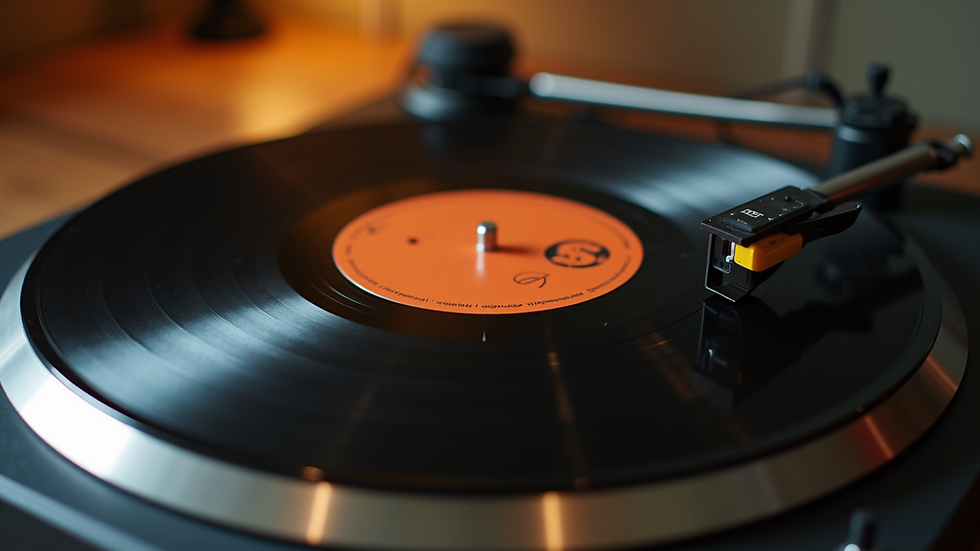The Universal Joy of Music Across Generations
- Taylor Dakake
- Sep 8, 2025
- 3 min read
Music is a powerful force that connects people across time and space. It transcends language, culture, and age, creating a shared experience that brings joy and comfort to everyone. Whether it’s the soothing melodies of a lullaby or the energetic beats of a dance track, music has a unique way of touching our hearts and minds. This blog explores how music resonates with different generations and why it remains a universal source of happiness.
Embracing Music for All Generations
Music is truly for everyone. From toddlers discovering their first tunes to seniors reminiscing with classic hits, the appeal of music spans all ages. It plays a vital role in emotional expression, social bonding, and cognitive development. For children, music can enhance language skills and creativity. For adults, it offers relaxation and motivation. For older adults, music often evokes cherished memories and provides comfort.
One practical way to enjoy music across generations is through family music sessions. These gatherings encourage sharing favorite songs, dancing together, and even learning new instruments. Such activities foster connection and understanding between age groups. Additionally, community events like concerts and music workshops often cater to diverse audiences, making music accessible and enjoyable for all.

The Importance of Music for All Ages
Music’s benefits extend beyond entertainment. It supports mental health, improves memory, and strengthens social ties. Studies show that engaging with music can reduce stress and anxiety, boost mood, and even improve physical health. For example, singing in a choir or playing in a band promotes teamwork and a sense of belonging.
In educational settings, music enhances learning by improving concentration and memory retention. Schools that incorporate music programs often see higher student engagement and academic performance. For seniors, music therapy is a valuable tool to combat loneliness and cognitive decline.
To experience the full benefits, it’s important to explore different genres and styles. From classical to hip-hop, jazz to folk, each type of music offers unique rhythms and messages that can resonate differently with individuals. Exploring music together as a family or community can open doors to new cultural experiences and deepen appreciation for diversity.

What Songs Do 60 Year Olds Like?
People in their 60s often have a rich musical history that reflects the popular sounds of their youth. Many enjoy classic rock, Motown, soul, and early pop hits from the 1960s and 1970s. Artists like The Beatles, Aretha Franklin, The Rolling Stones, and Stevie Wonder frequently top their playlists. These songs often evoke nostalgia and happy memories from significant life moments.
However, musical tastes can be diverse even within this age group. Some 60-year-olds appreciate contemporary music or genres like jazz and blues. The key is to recognize that music preferences are personal and shaped by individual experiences.
For those looking to connect with 60-year-olds through music, consider creating playlists that blend timeless classics with modern tunes. Attending concerts featuring legacy artists or tribute bands can also be a meaningful way to share musical enjoyment.

How Music Bridges Generational Gaps
Music serves as a bridge between generations by creating shared experiences and fostering empathy. When young and old listen to music together, they exchange stories and emotions that deepen their relationships. For example, grandparents might introduce grandchildren to songs from their youth, while younger family members share current hits.
Technology has made it easier to explore music across generations. Streaming platforms offer vast libraries where users can discover songs from any era. This accessibility encourages intergenerational dialogue and mutual appreciation.
Communities can also promote intergenerational music programs, such as joint choirs or dance classes. These initiatives not only improve musical skills but also build social connections and reduce age-related isolation.
Tips for Enjoying Music Across Generations
To make the most of music’s universal appeal, consider these practical tips:
Create mixed-age playlists - Combine songs from different decades and genres to appeal to everyone.
Attend live music events together - Concerts and festivals offer shared experiences that create lasting memories.
Learn an instrument as a family - Taking lessons or practicing together strengthens bonds and encourages creativity.
Use music for relaxation and mindfulness - Play calming tunes during stressful times to promote well-being.
Explore music history - Share stories behind favorite songs to deepen understanding and appreciation.
For more ideas and resources on how to enjoy music for all ages, check out specialized blogs and music education sites.
The Everlasting Power of Music
Music’s ability to unite people across generations is a testament to its enduring power. It enriches lives by providing joy, comfort, and connection. Whether through singing, dancing, or simply listening, music invites us to celebrate our shared humanity. Embracing music for all generations ensures that this beautiful art form continues to inspire and uplift us all.
By nurturing a love for music at every stage of life, we create a world where everyone can experience the universal joy that music brings.































Comments